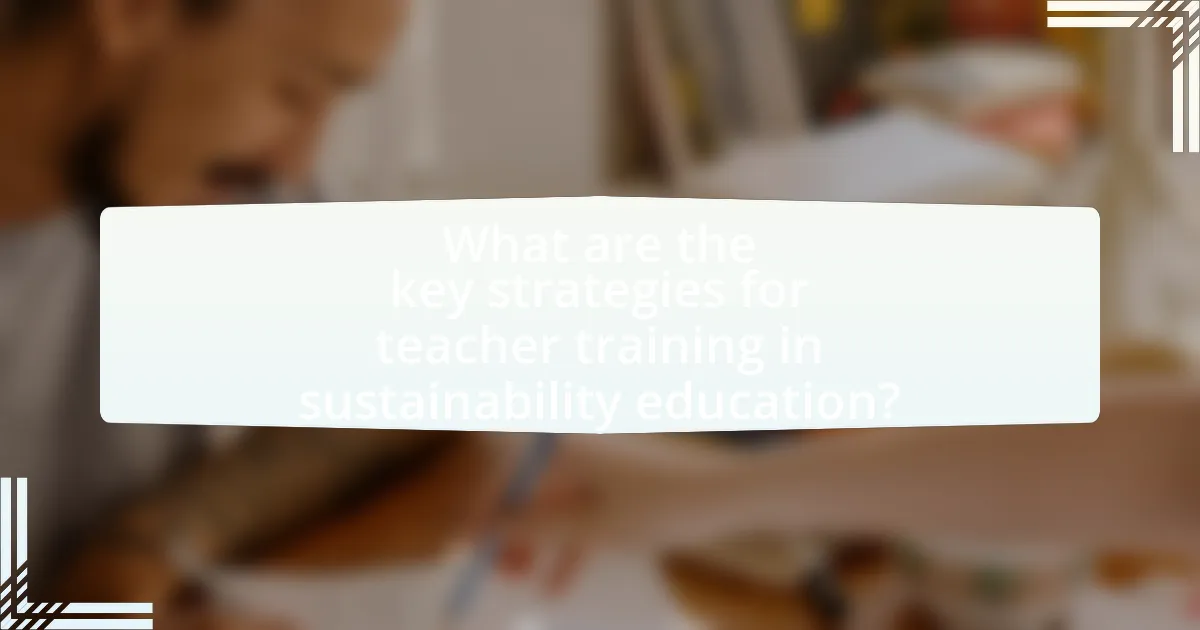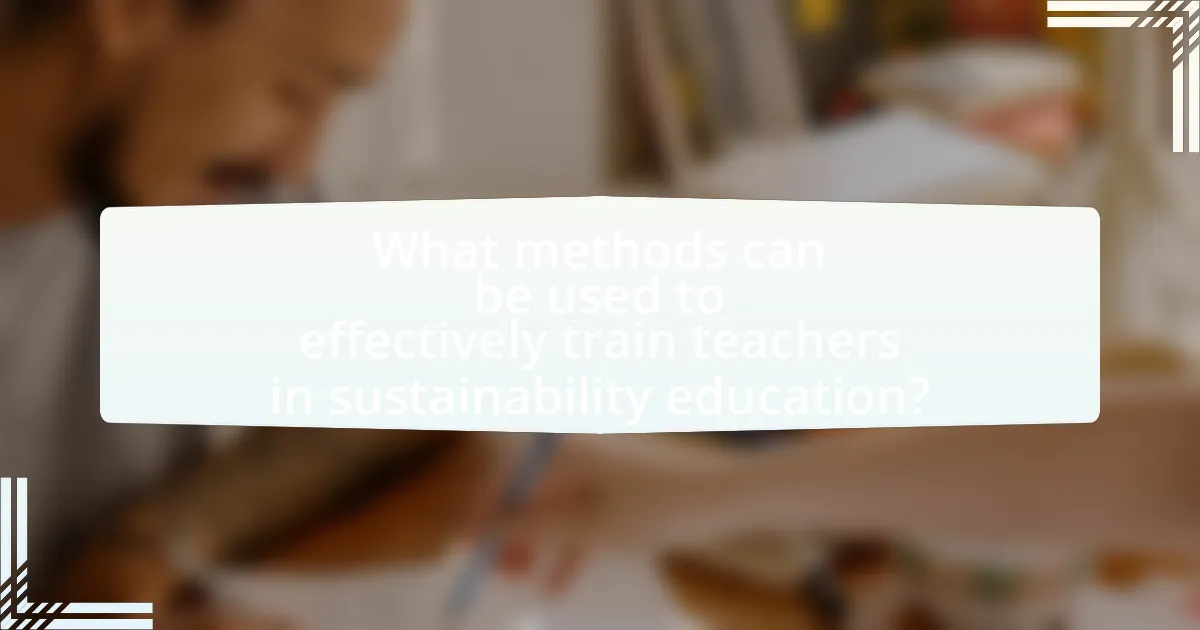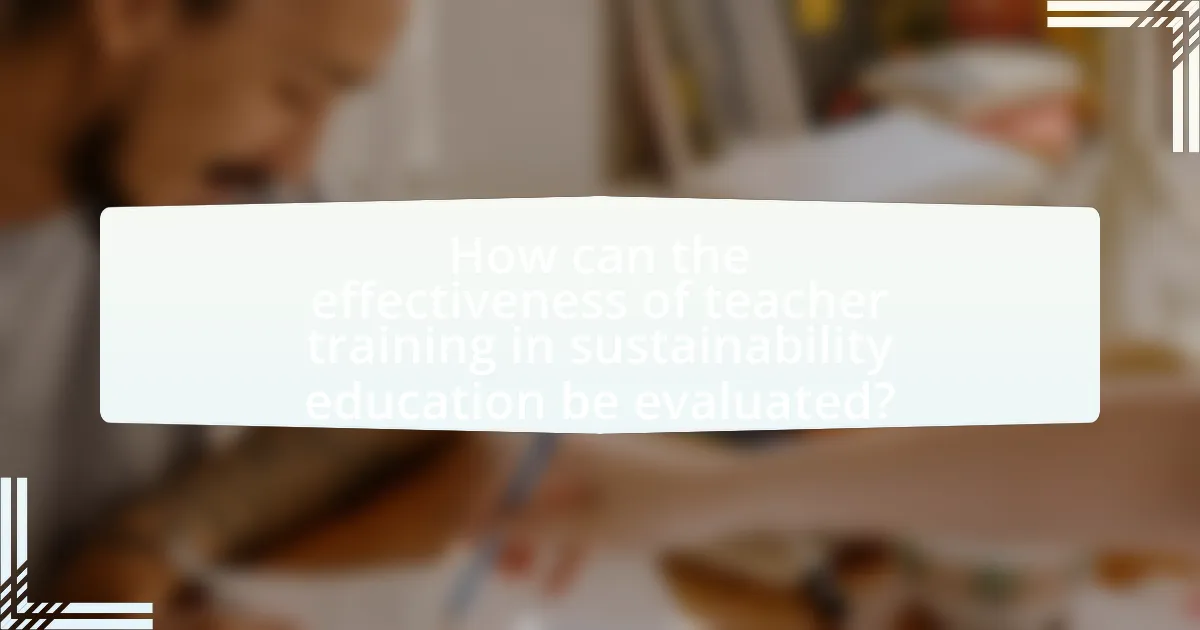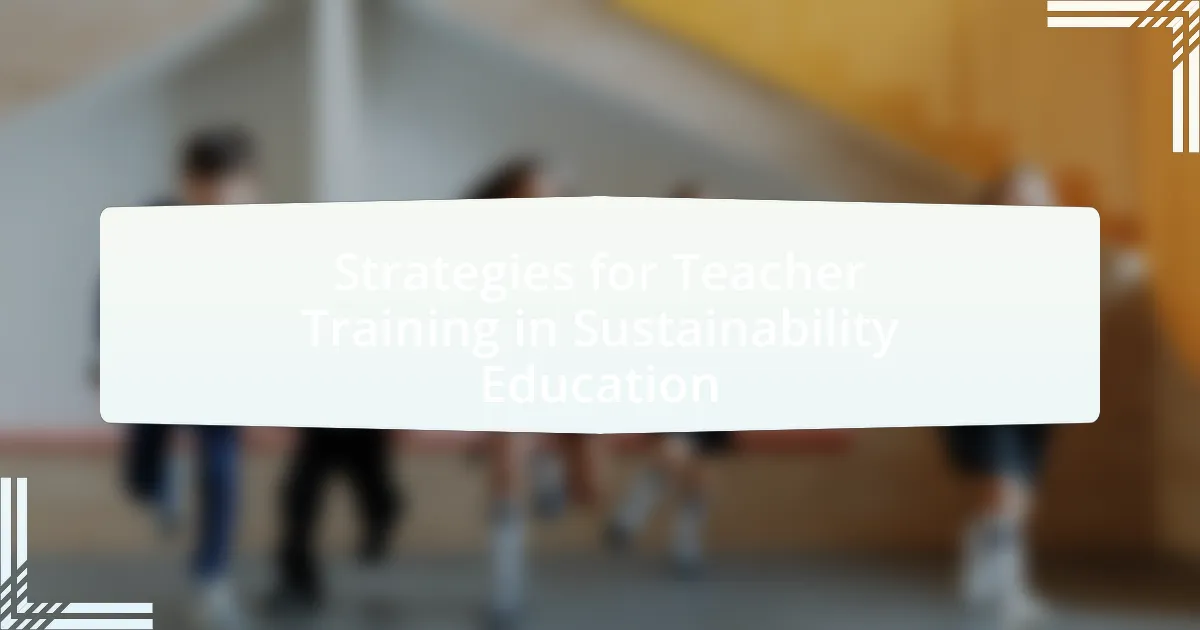The article focuses on key strategies for teacher training in sustainability education, emphasizing the importance of interdisciplinary approaches, experiential learning, and collaboration among educators. It outlines how teacher training programs can incorporate sustainability principles through curriculum integration and hands-on experiences, while highlighting essential topics such as climate change and renewable energy. The article also discusses the impact of effective teacher training on student outcomes, the role of ongoing professional development, and best practices for enhancing training relevance and engagement. Additionally, it addresses challenges in implementing sustainability education and strategies to overcome resistance to change within educational institutions.

What are the key strategies for teacher training in sustainability education?
Key strategies for teacher training in sustainability education include integrating interdisciplinary approaches, promoting experiential learning, and fostering collaboration among educators. Interdisciplinary approaches allow teachers to connect sustainability concepts across subjects, enhancing relevance and engagement. Experiential learning, such as outdoor activities and community projects, provides hands-on experiences that deepen understanding. Collaboration among educators encourages sharing best practices and resources, creating a supportive network for implementing sustainability education effectively. These strategies are supported by research indicating that active, collaborative, and integrated learning environments significantly improve educators’ ability to teach sustainability concepts.
How can teacher training programs incorporate sustainability principles?
Teacher training programs can incorporate sustainability principles by integrating environmental education into the curriculum and promoting sustainable practices among future educators. This can be achieved through modules that focus on ecological literacy, teaching methods that emphasize sustainability, and hands-on experiences in sustainable environments. Research indicates that programs that include practical applications, such as community projects or partnerships with local environmental organizations, enhance the understanding and commitment to sustainability among trainees. For instance, the National Council for Accreditation of Teacher Education (NCATE) emphasizes the importance of preparing educators to address sustainability in their teaching practices, which supports the integration of these principles into teacher training programs.
What specific sustainability topics should be included in the curriculum?
The curriculum should include topics such as climate change, renewable energy, sustainable agriculture, waste management, and biodiversity conservation. These topics are essential as they provide students with a comprehensive understanding of environmental challenges and solutions. For instance, the Intergovernmental Panel on Climate Change (IPCC) reports that climate change significantly impacts ecosystems and human societies, highlighting the need for education on this issue. Additionally, incorporating renewable energy topics aligns with the global shift towards sustainable energy sources, as evidenced by the International Energy Agency’s findings that renewable energy could account for 80% of global electricity by 2050.
How can experiential learning enhance sustainability education for teachers?
Experiential learning enhances sustainability education for teachers by providing hands-on, real-world experiences that deepen understanding and engagement with sustainability concepts. This approach allows teachers to actively participate in environmental projects, fostering critical thinking and problem-solving skills essential for teaching sustainability effectively. Research indicates that experiential learning increases retention of knowledge and promotes a sense of responsibility towards environmental stewardship, as evidenced by studies showing that teachers who engage in such learning experiences are more likely to implement sustainability practices in their classrooms.
Why is it important to train teachers in sustainability education?
Training teachers in sustainability education is crucial because it equips them with the knowledge and skills necessary to effectively teach students about environmental issues and sustainable practices. Educators play a pivotal role in shaping the values and behaviors of future generations, and by integrating sustainability into their teaching, they can foster critical thinking and problem-solving skills related to ecological challenges. Research indicates that when teachers are trained in sustainability, they are more likely to implement interdisciplinary approaches that engage students in real-world issues, thereby enhancing student learning outcomes and promoting environmental stewardship. For instance, a study by the National Council for Science and the Environment found that teachers who received professional development in sustainability were able to increase student engagement and understanding of complex environmental topics.
What impact does teacher training have on student outcomes in sustainability?
Teacher training significantly enhances student outcomes in sustainability by equipping educators with the necessary knowledge and skills to effectively teach sustainability concepts. Research indicates that teachers who undergo specialized training in sustainability education are more likely to implement innovative teaching strategies, which leads to improved student engagement and understanding of sustainability issues. For instance, a study published in the Journal of Environmental Education Research found that students taught by trained teachers demonstrated a 30% increase in their knowledge of sustainability practices compared to those taught by untrained educators. This evidence underscores the critical role that teacher training plays in fostering a deeper comprehension of sustainability among students.
How does sustainability education contribute to broader educational goals?
Sustainability education contributes to broader educational goals by fostering critical thinking, promoting interdisciplinary learning, and encouraging civic engagement among students. This educational approach equips learners with the skills necessary to address complex global challenges, such as climate change and social inequality. Research indicates that integrating sustainability into curricula enhances students’ problem-solving abilities and prepares them for active participation in their communities, aligning with goals of holistic education. For instance, a study by the United Nations Educational, Scientific and Cultural Organization (UNESCO) highlights that sustainability education not only improves academic performance but also cultivates responsible citizenship, thereby reinforcing the overall objectives of education systems worldwide.

What methods can be used to effectively train teachers in sustainability education?
Effective methods to train teachers in sustainability education include experiential learning, collaborative workshops, and integration of interdisciplinary approaches. Experiential learning allows teachers to engage directly with sustainability practices, enhancing their understanding through hands-on activities. Collaborative workshops foster peer-to-peer learning and sharing of best practices, which has been shown to improve teaching strategies and student engagement. Additionally, integrating interdisciplinary approaches encourages teachers to connect sustainability concepts across various subjects, making the content more relevant and applicable. Research indicates that these methods lead to improved teacher confidence and effectiveness in delivering sustainability education, as evidenced by studies such as the one conducted by the National Council for Science and the Environment, which highlights the positive impact of professional development programs focused on sustainability.
How can collaborative learning be utilized in teacher training?
Collaborative learning can be utilized in teacher training by fostering peer interaction and shared knowledge among trainees. This approach encourages teachers to engage in group discussions, co-create lesson plans, and participate in joint problem-solving activities, which enhances their understanding of sustainability education. Research indicates that collaborative learning improves critical thinking and teaching efficacy, as evidenced by a study conducted by Johnson and Johnson (2014) in the “Journal of Educational Psychology,” which found that collaborative methods lead to higher achievement and greater retention of information among educators.
What role do peer-to-peer learning and mentorship play in sustainability education?
Peer-to-peer learning and mentorship are crucial in sustainability education as they foster collaborative knowledge sharing and practical skill development. This approach allows educators and learners to exchange experiences, insights, and strategies, enhancing their understanding of sustainability concepts. Research indicates that peer interactions can significantly improve engagement and retention of sustainability principles, as seen in studies where collaborative projects led to a 30% increase in student comprehension of environmental issues. Furthermore, mentorship provides guidance and support, enabling individuals to navigate complex sustainability challenges effectively, thereby promoting a culture of continuous learning and adaptation in educational settings.
How can online platforms enhance teacher training in sustainability?
Online platforms can enhance teacher training in sustainability by providing accessible resources, interactive learning modules, and collaborative networks. These platforms enable educators to access a wide range of materials, including research articles, case studies, and best practices in sustainability education, which can be tailored to their specific teaching contexts. For instance, the use of webinars and online courses allows teachers to engage with experts in the field, fostering a deeper understanding of sustainability concepts. Additionally, platforms like Edutopia and Coursera offer community forums where educators can share experiences and strategies, promoting peer learning and support. Research indicates that online professional development can lead to improved teaching practices and student outcomes, as evidenced by a study published in the Journal of Teacher Education, which found that teachers who participated in online training reported increased confidence and effectiveness in teaching sustainability topics.
What are the challenges faced in implementing sustainability education training?
The challenges faced in implementing sustainability education training include a lack of resources, insufficient teacher training, and resistance to change within educational institutions. Limited funding often restricts access to necessary materials and programs, making it difficult to effectively teach sustainability concepts. Additionally, many educators may not have received adequate training in sustainability topics, leading to a gap in knowledge and confidence when delivering the curriculum. Resistance to change can also stem from established educational practices and curricula that do not prioritize sustainability, making it challenging to integrate new approaches. These factors collectively hinder the successful implementation of sustainability education training in schools.
How can resistance to change be addressed in teacher training programs?
Resistance to change in teacher training programs can be addressed by implementing collaborative professional development that actively involves teachers in the change process. Engaging educators in decision-making fosters ownership and reduces resistance, as evidenced by research from the National Staff Development Council, which found that teacher involvement in training design leads to higher acceptance of new practices. Additionally, providing ongoing support and resources, such as mentorship and access to relevant materials, can help teachers adapt to changes more effectively. This approach is supported by studies indicating that sustained professional development increases teachers’ confidence and willingness to embrace new methodologies.
What resources are necessary to support effective sustainability education training?
Effective sustainability education training requires a combination of curriculum materials, professional development opportunities, and access to community resources. Curriculum materials should include comprehensive guides and lesson plans that integrate sustainability concepts across various subjects. Professional development opportunities, such as workshops and seminars, enable educators to enhance their knowledge and teaching strategies related to sustainability. Access to community resources, including partnerships with local organizations and environmental experts, provides practical experiences and real-world applications of sustainability principles. These resources collectively support educators in delivering impactful sustainability education.

How can the effectiveness of teacher training in sustainability education be evaluated?
The effectiveness of teacher training in sustainability education can be evaluated through a combination of pre- and post-training assessments, classroom observations, and student feedback. Pre- and post-training assessments measure knowledge gains and changes in attitudes towards sustainability, while classroom observations provide insights into the application of training in real teaching scenarios. Additionally, student feedback can indicate how well teachers are integrating sustainability concepts into their lessons, reflecting the training’s impact on student learning outcomes. Research shows that effective evaluation methods lead to improved teaching practices and enhanced student engagement in sustainability topics.
What metrics can be used to assess the impact of training programs?
Metrics that can be used to assess the impact of training programs include participant satisfaction surveys, knowledge assessments, behavior change evaluations, and performance metrics. Participant satisfaction surveys gauge immediate reactions and perceived value of the training, while knowledge assessments measure the increase in understanding of sustainability concepts. Behavior change evaluations track the application of learned skills in real-world settings, and performance metrics assess improvements in teaching effectiveness or student outcomes. Research indicates that using a combination of these metrics provides a comprehensive view of training effectiveness, as demonstrated in studies like the “Impact of Professional Development on Teacher Practice” by Desimone (2009), which highlights the importance of multiple assessment methods in evaluating training outcomes.
How can feedback from teachers inform the improvement of training strategies?
Feedback from teachers can inform the improvement of training strategies by providing insights into the effectiveness and applicability of the training content. Teachers’ experiences in the classroom reveal what aspects of the training are beneficial and which areas require enhancement, allowing for targeted adjustments. For instance, a study by the National Center for Education Statistics found that 70% of teachers reported that feedback from their peers and trainers significantly influenced their professional development choices. This data underscores the importance of integrating teacher feedback into the training process to ensure that strategies align with real-world teaching challenges and promote effective sustainability education.
What role does ongoing professional development play in sustainability education?
Ongoing professional development is essential in sustainability education as it equips educators with the latest knowledge, skills, and pedagogical strategies necessary to effectively teach sustainability concepts. Continuous training ensures that teachers remain informed about emerging sustainability issues, innovative teaching methods, and interdisciplinary approaches, which are crucial for fostering a comprehensive understanding of sustainability among students. Research indicates that teachers who engage in regular professional development are more likely to implement sustainability practices in their classrooms, thereby enhancing student engagement and learning outcomes. For instance, a study published in the Journal of Environmental Education Research found that teachers who participated in sustainability-focused professional development programs reported increased confidence and competence in teaching sustainability topics.
What best practices can enhance teacher training in sustainability education?
Integrating experiential learning and interdisciplinary approaches are best practices that can enhance teacher training in sustainability education. Experiential learning allows teachers to engage in hands-on activities that reflect real-world sustainability challenges, fostering deeper understanding and practical skills. For instance, programs that include field trips to local ecosystems or community projects enable teachers to apply theoretical knowledge in practical settings. Interdisciplinary approaches encourage collaboration across subjects, linking sustainability concepts with science, social studies, and economics, which can lead to a more holistic understanding of sustainability issues. Research by the National Council for Science and the Environment indicates that such integrated training methods significantly improve educators’ ability to teach sustainability effectively, as they provide diverse perspectives and tools necessary for addressing complex environmental issues.
How can integration of local environmental issues improve training relevance?
Integrating local environmental issues into training enhances relevance by aligning educational content with the immediate concerns of the community. This approach ensures that educators are equipped to address specific environmental challenges faced by their students, fostering a deeper connection between theoretical knowledge and practical application. For instance, a study by the National Oceanic and Atmospheric Administration found that place-based education, which incorporates local environmental contexts, significantly increases student engagement and retention of information. By focusing on local issues, training becomes more applicable and impactful, ultimately preparing educators to inspire action and awareness in their students regarding sustainability.
What strategies can ensure continuous engagement in sustainability education for teachers?
Continuous engagement in sustainability education for teachers can be ensured through ongoing professional development, collaborative learning communities, and integration of sustainability into the curriculum. Ongoing professional development, such as workshops and online courses, keeps teachers updated on the latest sustainability practices and pedagogical strategies. Collaborative learning communities foster peer support and sharing of best practices, enhancing motivation and commitment to sustainability education. Additionally, integrating sustainability into existing subjects makes it relevant and applicable, encouraging teachers to incorporate these principles into their teaching. Research indicates that teachers who participate in sustained professional development are more likely to implement sustainability practices in their classrooms, leading to improved student outcomes and a culture of sustainability within schools.

Leave a Reply